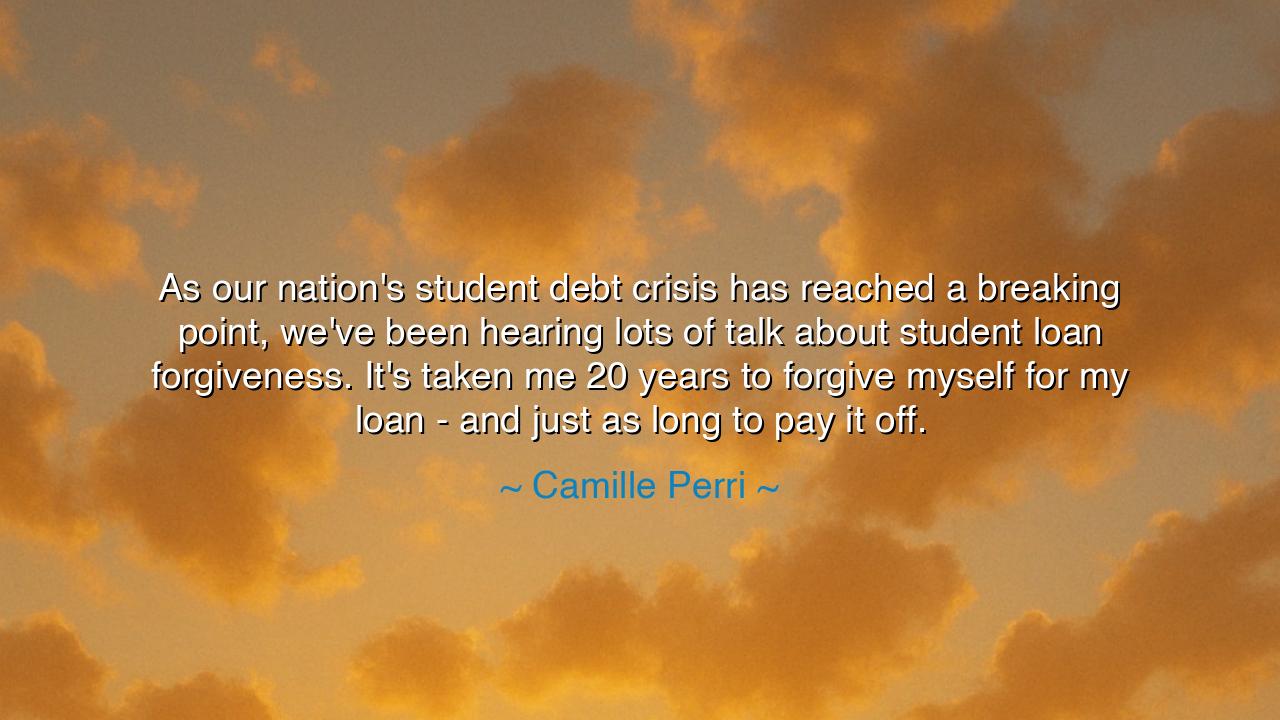
As our nation's student debt crisis has reached a breaking point
As our nation's student debt crisis has reached a breaking point, we've been hearing lots of talk about student loan forgiveness. It's taken me 20 years to forgive myself for my loan - and just as long to pay it off.






Host: The room was quiet, the soft hum of the world outside barely making its way in. Jeeny sat at the table, her fingers tracing the edges of a notebook, her thoughts seemingly elsewhere. Jack stood by the window, his gaze distant, the city lights flickering in the distance. The weight of the conversation seemed to hang in the air, as if something deeper was about to unfold. Finally, Jack spoke, his voice calm but filled with reflection.
Jack: (his voice soft, almost bittersweet) "As our nation's student debt crisis has reached a breaking point, we've been hearing lots of talk about student loan forgiveness. It's taken me 20 years to forgive myself for my loan — and just as long to pay it off."
Jeeny: (looking up, her voice gentle, but understanding) "That’s so powerful. The idea of forgiveness, not just from others, but of ourselves. It’s funny how we often think of forgiveness as something that happens between people, but here it’s about forgiving yourself for a choice or burden you feel responsible for. It’s a heavy weight, isn’t it?"
Jack: (nodding slowly, his voice reflective) "It is. The pressure to succeed, to get that education, and to make the ‘right’ decisions often feels like it leads us into debt, but it’s not just the money that weighs you down. It’s the emotional cost, too. You think paying it off will give you peace, but there’s always that lingering guilt, that sense of failure, even after it’s gone."
Jeeny: (her voice soft, almost with empathy) "It’s like you’re not just paying off the loan, but all the expectations that came with it — the pressure to make something of yourself, to prove it was worth it. That’s the hidden cost of student debt, isn’t it? The emotional toll it takes on your sense of self-worth."
Jack: (his tone quieter, almost weary) "Exactly. It’s a burden that’s hard to shake off. It’s not just about numbers on a statement or checks you write to pay it off. It’s about the shame, the feeling of not being able to keep up, the weight of a decision that’s always hovering over you, even once the debt is cleared."
Jeeny: (nodding, her voice compassionate) "And yet, there’s a part of you that has to come to terms with it. Like, ‘I did the best I could with the information I had at the time.’ It’s not easy to let go of that guilt, but sometimes it’s about acknowledging that you’re only human. And you’re not defined by the debt or the choices you made."
Jack: (his voice slightly lighter, as if the words were bringing clarity) "It’s true. The forgiveness isn’t just about clearing the financial debt; it’s about clearing the emotional debt, too. Realizing that we all make mistakes, and sometimes those mistakes come with consequences, but they don’t have to define who we are."
Jeeny: (smiling softly, her voice reassuring) "Exactly. You can’t change the past, but you can choose how to see it. The lesson isn’t just in paying off the loan; it’s in accepting that you did what you could, and that’s enough. Sometimes, the biggest burden we carry is the guilt we impose on ourselves."
Host: The room seemed to grow lighter, the weight of the conversation shifting. Jack and Jeeny had uncovered a truth about debt that went beyond numbers and financial figures. It was about the emotional journey — the need to forgive oneself, to release the guilt, and to realize that mistakes or burdens don’t define us. The road to forgiveness, both financial and emotional, wasn’t easy, but it was one worth traveling, a path toward healing and self-compassion. In that moment, they both understood that sometimes the hardest part of paying off a debt isn’t the money, but the emotional cost that comes with it.






AAdministratorAdministrator
Welcome, honored guests. Please leave a comment, we will respond soon